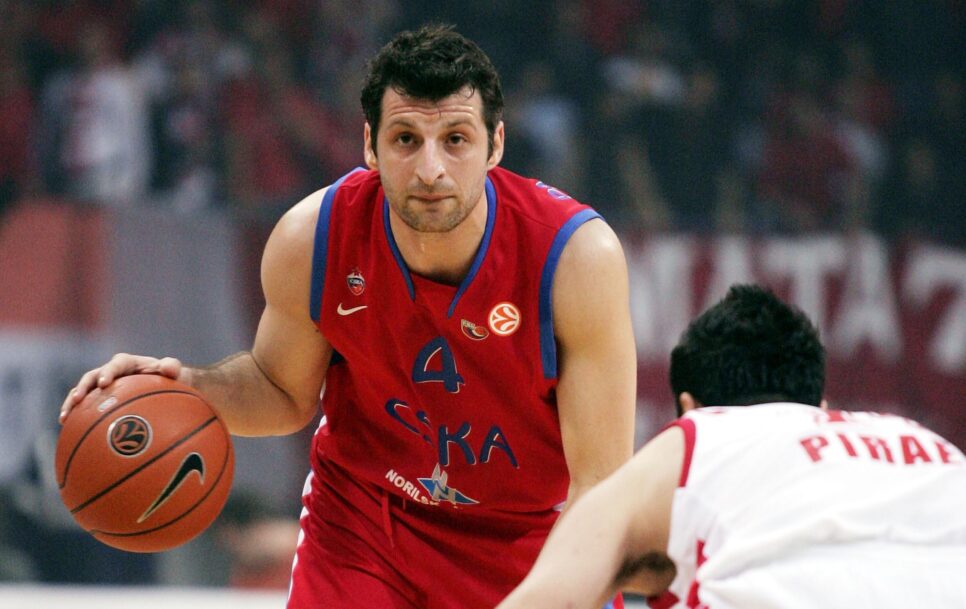The biggest flop of the EuroLeague Final Four
In the 2004/05 EuroLeague season, it seemed like the stars had aligned for CSKA Moscow to end their 34-year title drought in Europe’s top competition. After dominating almost everyone on their way to the Final Four, which was held on their home court, the Russian powerhouse completely collapsed.
As always, CSKA assembled a strong roster for the season, including EuroLeague point guard great Theodoros Papaloukas, naturalized American Jon Robert Holden, and prolific scorer Marcus Brown, among others.
Not only were they stacked on the court, but CSKA was also coached by one of the best European tacticians of all time: Dušan Ivković. The Serbian coach was hired in 2002 with a single goal in mind – to bring the EuroLeague title back to Moscow for the first time since 1971.
14-0
Twenty years ago, the EuroLeague featured 24 teams divided into three groups of eight. During the regular season, each team played every other team in its group both home and away, resulting in 14 games for each team in the first stage. The top five teams in each group, along with the best sixth-placed team, advanced to the next round.
CSKA faced stiff opposition in Group C, which included Panathinaikos Athens (Greece), Tau Ceramica (Spain), now known as Baskonia, and Benetton Treviso (Italy). Despite the strong competition, Ivković’s men won all 14 games.
In the Top 16 stage, CSKA competed against Scavolini Pesaro (Italy), Barcelona, and Real Madrid (both Spain). Just like in the regular season, the Russian powerhouse advanced without much trouble, though they did lose their first game of the EuroLeague season, falling 68-79 to Barcelona at home. Of course, there’s no shame in losing to a team that featured European greats Dejan Bodiroga, Juan Carlos Navarro, and a young future NBA champion, Marc Gasol.
In the quarterfinals, CSKA faced Ülker, whom they had already beaten twice in the regular season. The now-defunct Turkish club tried to put up a fight but lost the series convincingly, as CSKA defeated them by 14 and 18 points, respectively.
When the Final Four arrived in Moscow, CSKA was by far the favorite to win it all, although it was clear that Tau Ceramica would be a tough opponent in the semifinals. Their regular-season matchups had been close, with CSKA winning both games by narrow margins: five points in Moscow and four points in Vitoria.
Troubles at the line
That semifinal was peculiar. CSKA grabbed 16 offensive rebounds and shot a lot of free throws – 28, to be exact – but couldn’t capitalize on their second-chance opportunities and made just ten shots from the line. Even Brown, an 85.7% career free throw shooter, connected on only one of four attempts.
Tau Ceramica had a much better shooting night, especially from long range. Moreover, CSKA was rather helpless against one of the best European offensive players of his time, Arvydas Macijauskas, who scored 23 points.
While CSKA had a tremendous roster, Tau Ceramica also boasted great players. Although Macijauskas led the charge in the semifinal, he had plenty of help from future NBA players José Calderón, Luis Scola, and Pablo Prigioni.
After losing the semifinal 78-85, CSKA’s heart was broken. They put up a fight two days later to salvage something from the Final Four, but despite outrebounding Panathinaikos 52-35, the Greens emerged victorious, led by Mike Batiste’s 28 points.
CSKA’s season, which had been nearly perfect leading up to the Final Four, was shattered in just two games.
Ivković remarked many years later that in 2005, CSKA had all the prerequisites to win the title and did everything they could. “In the semifinals against Tau Ceramica, we were unlucky. We had beaten them four times in a row, and in one game Papaloukas even made a gesture that we had ‘killed them.’”
At the Final Four in Moscow, CSKA was banned from practicing in the arena where the games were to be played due to the rules. “Under pressure, without training on the court, we faced a very strong team. They had Calderón, Prigioni, Macijauskas in great form, Andrés Nocioni, Scola, and Fabricio Oberto. Had we played on a neutral court, we would have won the trophy,” Ivković was sure.
He went as far as to say that he personally owes CSKA the 2005 EuroLeague title.
Inevitable changes
Although CSKA ended their domestic season with another championship, their third under Ivković, it was clear that the following summer would bring significant changes. While some key players like Brown and American forward Antonio Granger left, the core of the team remained intact.
Several important players were brought in. Slovenian power forward Matjaž Smodiš joined after a great season with Fortitudo Bologna, and former 11th pick in the NBA draft, Trajan Langdon, was acquired from CSKA’s city rivals Dynamo. The duo quickly rose to prominent roles.
Perhaps the biggest change CSKA made in the summer of 2005 was at the bench. While Langdon came from Dynamo to CSKA, Ivković went the other way and was replaced by another highly successful and respected head coach, Ettore Messina.
Under the Italian mastermind’s leadership, CSKA not only stayed at the forefront of European basketball but also managed to win two EuroLeague titles in 2006 and 2008.
The devastating Final Four of 2005 ignited a fire within the team, fueling their determination to end their lengthy championship drought in Europe.






